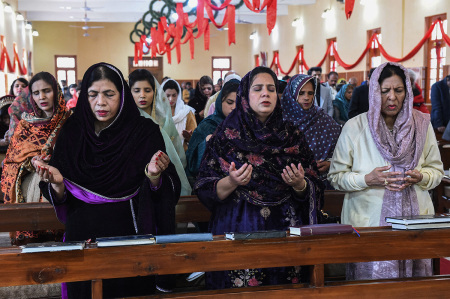'Hidden' abuses against Christian women spotlighted on Int'l Day for Victims of Religious Violence

From tear-gas attacks on churches to girls being forced into Islamic marriage, the "hidden" abuses women face and the increasing trend of persecution against Christians are receiving a global spotlight Thursday.
As the United Nations observes its sixth International Day Commemorating the Victims of Acts of Violence Based on Religion or Belief, the Permanent Mission of Poland to the U.N. in New York is holding a side event focusing specifically on discrimination women face because of their religion or belief and how those women can be empowered.
The Aug. 22 annual day of observance resolution was enacted by the U.N. General Assembly in 2019 to highlight "continuing violence and acts of terrorism targeting individuals, including persons belonging to religious minorities" based on their religion.
"We are grateful to the United Nations for its efforts to draw attention to the topic of religiously motivated violence and discrimination," Ryan Brown, the CEO of the persecution watchdog group Open Doors US, who will be participating in the virtual side discussion, told The Christian Post.
"We in the West can be far too unaware of all that Christians around the world endure for their decision to follow Jesus, and they need our prayers and support."
According to a 2024 Open Doors US "Gender Report," the top five pressure points in 2024 for women and girls are forced marriage, sexual violence, physical violence, psychological violence and abduction.
Forced marriage is a risk for women and girls in 84% of 50 countries on the group's annual World Watch List of countries where Christians are most persecuted and 82% for sexual violence. Women and girls are also at risk of facing physical violence in 72% of these countries, and 62% of girls are at risk of abduction and psychological violence.
Various factors contribute to women's persecution, including social class, marital status and the culture's view on the role of women. A statement announcing Thursday's event states that "women's suffering remains hidden from the public eye and the distinctiveness of their situation falls outside the international community's attention."
Females are vulnerable to sexual discrimination and abuse due to cultural ideas about honor, and the persecution typically happens behind closed doors. Those within the woman's community are usually the perpetrators.
"The average number of Pressure points per country for women and girls in 2024 was 8.4, in comparison to 6.6 Pressure points per country for men and boys," the report noted. "This does not speak to the severity of persecution, but does suggest that women and girls especially face a multiplicity of types of pressure and violence."
Women in certain parts of the world who have, for example, converted to Christianity and renounced Islam may be coerced into a marriage with a non-Christian man. Christian women and girls in places like Pakistan or Nigeria may be abducted and forced into a marriage with a soldier or forced to marry a much older Muslim man.
"FORB-related violence and discrimination against women and girls often take place in the private sphere and is underreported due to lack of available and effective recourses, but also shame and stigma," the announcement states.
"It is so because for women and girls such violence takes form of a forced marriage, including to exert a forced conversion, sexual violence, abduction, FGM, and exclusion from a community."
Marking the Aug. 22 observance, the Vienna-based Observatory on Intolerance and Discrimination is urging people not to lose sight of the rising Christian intolerance it is chronicling in Europe. In its latest annual report released last November, Christians in Europe reported a 44% increase in anti-Christian hate crimes.
"In the West, we tend to think of violence against religious believers as primarily a problem of countries in Africa and Asia," Anja Hoffmann, executive director of OIDAC Europe, said in a statement shared with CP. "While it is important to highlight these dramatic examples of persecution, we must also pay close attention to what is happening in Europe."
"Most anti-Christian attacks in Europe are directed against churches and cemeteries, but we sadly also continue to see violent attacks against Christian individuals," Hoffmann added.
The French Ministry of the Interior recorded almost 1,000 anti-Christian hate crimes in 2023. According to the observatory, 90% of these incidents were directed against churches and cemeteries in addition to 84 "personal attacks with an anti-religious motive against Christians."
Since the beginning of 2024, the observatory has documented 25 cases of physical violence, threats or attempted murder against Christians in the United Kingdom, France, Spain, Italy, Germany, Austria, Poland and Serbia. One example is a French Seventh-Day Adventist church that was attacked with tear gas during a service in June. Nine people were injured.
Open Doors' annual report released earlier this year found an increase in violence against Christians and places of worship worldwide. At least 14,766 churches and Christian properties were attacked globally, and nearly 5,000 Christians were killed for their faith.
Brown says the day of observance is a great opportunity to remind governments worldwide that the "international community is aware of the human rights violations that are taking place within their borders and does not sanction these abuses."
"We call upon those nations which claim to recognize religious freedom that they would indeed uphold such laws, and we join our voices with those fighting for human rights around the globe in applying pressure to totalitarian and radical regimes to lift their restrictions on religious freedom," Brown stressed.
Samantha Kamman is a reporter for The Christian Post. She can be reached at: [email protected]. Follow her on Twitter: @Samantha_Kamman






















